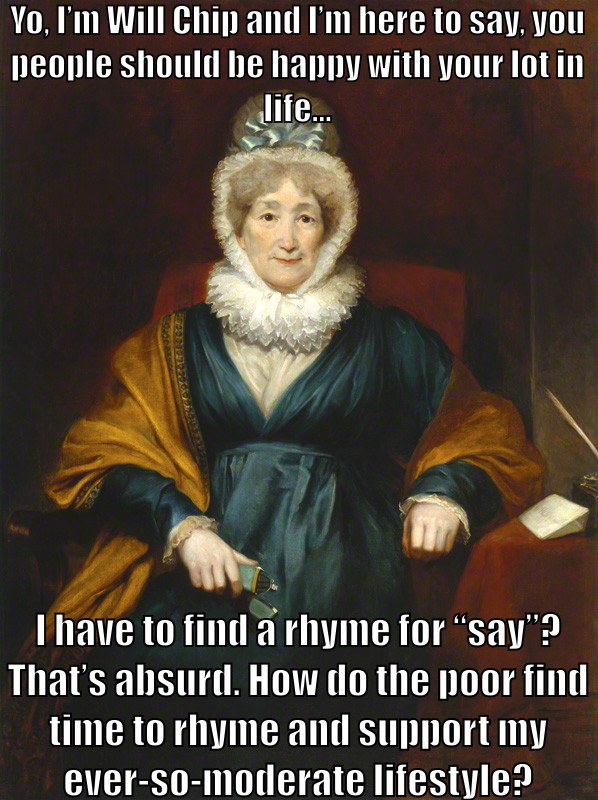Hannah More, a well-known philanthropist and playwright, author of one novel and many Evangelical moral tracts, saw the growth of novel reading as a serious threat. More is actually a really interesting and complex character, so before we chuckle at her silly ideas, let’s learn more about her. More was a strong believer in education. She used some of her money and a lot of her time to establish schools for the poor, and she argued that women should be educated. Amazingly, she managed to catch flak from both the people she was trying to help and from certain religious factions. Apparently some farmers were convinced that education would mean the death of agriculture, and considering how things have changed since the late 1700s, this may be one of the least absurd claims you will read in this whole article. She also managed to get involved in the Blagdon controversy, which started as a minor squabble about an employee at one of her schools. However, fueled by the anxiety so many people in power had about educating the poor, or at least allowing any random philanthropist to educate the poor, it quickly exploded into a national controversy that lasted for at least three years.
It might sound like More was a progressive reformer trapped between the ignorant masses and the heartless elites, and in some ways that was true. But the situation was not that simple. More believed that women should be educated so that they could be better wives and mothers, and for no other reason. Not even to make them sexier. Sorry, Reverend Fordyce. She believed the poor should be educated only to the point where they were optimally useful to middle- and upper-class society and not at all interested in decapitating their oppressors like the French had done. A number of people claim that More’s schools taught reading but not writing (because poor people who can write are just plain dangerous), but in an 1821 letter to Sir W. W. Pepys, More describes asking a teacher in one of her schools to teach writing. I haven’t seen an actual source for the claim that her schools refusing to teach writing, so I’m not sure what’s up here, but in the next paragraph of her letter, she complains that an educational reformer feels that
there is nothing which the poor ought not be taught: they must not stop short of science. They must learn history in its widest extent: Goldsmith’s Greece is nothing; — he recommends Mitford &c. Now the absurdity of the thing is most obvious; supposing they had the money to buy such books1, where would they find the time to read them, without the neglect of all business and the violation of all duty? And where is all this to terminate? Only cast back your eye upon Athens, where the upper-gallery pronounced sentence on Sophocles and Europades, and an herb-woman could detect the provincial accent of a great philosopher. Yet, was there ever a more turbulent, ungovernable rabble?
Hannah More spent a lot of time writing things for the poor. She wrote Village Politics, by Will Chip, a response to Thomas Paine’s Rights of Man. Will Chip was an alleged carpenter, so it was sort of the 18th-century equivalent of Joe the Plumber. In Village Politics, More middleclassplained to the poor that they should be happy to toil in poverty, thrilled to be abused, and content with their short lives. She wasn’t particularly worried about how they would find the time or money to read Village Politics, of course. She was also in charge of a series called Cheap Repository Tracts, some of which she herself wrote, designed to do basically the same thing. Again, she wasn’t worried that the poor couldn’t find the money or the time for all of the stuff she wrote. Her real fear was that an educated populace wouldn’t be so keen to break their backs keeping her living comfortably.

In one of the Cheap Repository Tracts entitled The Sunday School, More writes a story about a woman raising money for a Sunday school. This may well be more than a little bit autobiographical, but it certainly convey’s More’s views on reading. Ms. Jones, the woman hard at work to create and fund a school, is asking a farmer to provide a little financial support. The farmer says, “Of all the foolish inventions, and new-fangled devices to ruin the country, that of teaching the poor to read is the very worst.” Ms. Jones replies,
So it may, if you only teach them to read, and turn them adrift to find out books by themselves. … Only look round your own kitchen, I am ashamed to see it hung round with loose songs and ballads. I grant, indeed, it would be better for your men and maids, and even your daughters, not to be able to read at all than to read such stuff as this. But if when they ask for bread you give them a stone, nay worse, a serpent, yours is the blame.
Not only should education for the poor be sharply limited, but so should their access to reading material, including songs and ballads. I mean, look at what has happened since we started teaching science and history and (for a while, at least) music in public schools. The 1% have really gotten screw– wait, hold up… no, they’re doing very, very well. Never mind.
Now I’m trying to picture the 18th-century prequel to Equilibrium, in which the main character accidentally spills a glass of water on his pile of Cheap Repository Tracts and ends up burning down the printing house that produces all of the Tracts.

Let’s look at Hannah More’s score.
| Stock Attack | Used? |
|---|---|
| Stimulation of violence, sadism, and criminality | ❌ |
| Undermining of sexual morality and legitimate authority | ✅ |
| Promotion of passivity through narcotization, hypnosis, and desensitization | ½ |
| Substitution of fantasy for reality; promotion of escapism | ❌ |
| Promotion of stereotypy, distortion, oversimplification, and irrelevance | ✅ |
| Deliberate emotional manipulation and exploitation of consumers | ❌ |
| Destruction of literacy | ❌ |
| Weakening of family ties | ❌ |
| Destruction of artistic integrity and creativity in society | ❌ |
| Homogenization of culture at the lowest level | ❌ |
| Promotion of materialism and conformity | ½ |
| Making readers less intelligent | ❌ |
| Posing an actual physical risk to health | ❌ |
| Being addictive in the same way that drugs or alcohol are | ❌ |
| Being metaphorically (or literally) infectious, toxic, or venomous | ✅ |
| Causing the end of some mythical golden age, or at least reminding us of its end | ❌ |
| Being fun or pleasant, since nothing fun or pleasant can be good for you | ❌ |
| Total: | 4 |
I gave her half a point extra for actually believing that books can promote passivity through narcotization, hypnosis, and another half a point for desensitization and promote materialism and conformity, even though she saw those as good things and key reasons to teach the poor to read. Hannah More’s final score is 4.
Next time, we’ll meet James Baldwin, Ph.D. Poor Dr. Baldwin was tragically born without a sense of perspective; as a result, he believes that books are literally the worst things ever.
1: Those circulating libraries that your friends are all so worried about will at least fix this problem.

